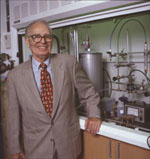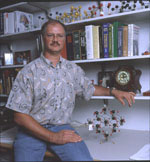|
Inorganic
Chemistry Research Opportunities |
|
|
|
|
|
Research
Projects: Chemistry
and Materials Science of the Group III (13) metals
1.
Aluminum-oxide nano-particles as new materials and precursors for
ceramics with controlled porosity.
2. Group 12/13 catalysts for H/D exchange and olefin oligomerization.
3. The chemistry of borate and aluminates in the oil industry.
4. Alumoxane catalysts.
Your Job in the Lab: The
students are given their own project to work on.
Recommended experience: The
student should have already taken undergraduate chemistry labs (i.e.
CHEM 121-122 (general chemistry labs), 213-214 (the organic chemistry
labs), or the module system).
Positions Open: There is currently
1 position for the summer and 1 position for the fall of 2000.
Students may continue working through the year if they come in during
the summer. |
|
|
|
|
|
| CVD
Diamond Growth Mechanisms, Reactions of Metal Atoms and
Small Clusters, Measurements of the Physical and
Thermodynamic Properties of Liquid Metals and Alloys |
|
|

|
|
|
| Diamond Films,
Levitation Studies, Environmental Chemistry, Matrix-Isolation Studies, Fluorine Chemistry
|
|
|

|
|
|
|
Description: The Whitmire
research group is involved in a number of inorganic and organometallic
research projects. These projects involve synthesis of new cluster
compounds, metal alkoxides and other metal complexes which are targeted
for their relevance to catalysis, materials science and pharmaceuticals.
We are exploring the catalysis of industrially important transformations
of organic molecules as catalyzed by transition metal clusters and have
a new apparatus that allows us to probe these reactions directly under
reaction conditions. We are also interested in preparing new metal
alkoxides and are developing routes to making heterometallic species
which may be used as precursors to existing or new solid state materials
or oxidation catalysts. We are also beginning to develop a program
in pharmaceutical bismuth compounds since bismuth has a documented
biological activity but is the least toxic of the heavy metals.
These synthetic studies are under girded by molecular orbital
calculations and we collaborate with the research group of Professor
Jean-Yves Saillard in Rennes, France, in order to carry out that work.
Besides the normal synthetic and analytical techniques taught in the
laboratory classes at Rice, members of the group learn hands on about
single crystal x-ray diffraction and multinuclear, variable temperature
nuclear magnetic resonance which are very valuable for understanding the
structures in both solid and solution phases as well as probing
molecular dynamics.
Your Job in the Lab:
Undergraduates who join the research group are given independent
research projects and are encouraged to develop their own ideas and
strategies in consultation with Professor Whitmire and the other
researchers in the group. Research plans are developed after
consideration of the undergraduate student's goals and interests in
research and what types of techniques he/she wishes to learn.
Recommended experience:
Generally having a solid background in freshman chemistry is adequate.
Much of the lab work is specialized, such as the use of vacuum lines,
Schlenk lines and dry boxes, and is taught during the course of
the project.
Positions Open: I have at
least one and probably two paid positions available for the summer 2000
and could easily accommodate 4 students during the fall semester. |
|
|

|
|
|
Organization: The graduate students are very helpful, and the professor comes by once a
day, but is generally less accessible.
Environment: This is a fun
group, with some of the more cheerful grad students in the university. They sing along
with songs on the radio, have a sense of humor, and usually seem to enjoy what they're
doing. Typically, you'll spend 10-12 hrs/wk in lab, doing a lot of repetitive
chromatography.
What you would learn:New
challenges are always presenting themselves.
Suggested Experience:Definitely
Chem 351/352. Previous lab experience is helpful, since you're on your own more in this
lab than in others. There aren't people around to show you basic techniques, like how to
set up a distillation apparatus. |
|
|
|